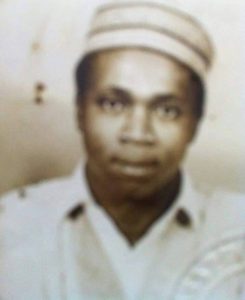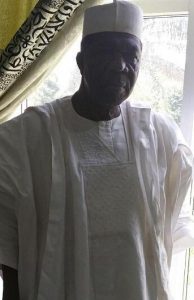
A much younger Okpani Ochiga
Death has occurred of Comrade Patrick Ameh Ochiga, a unionist, politician and community leader in Okpokwu Local Government Area of Benue State. He gave up the ghost earlier this morning on the way to the hospital. At over 86 years of age and for the fact that he has been battling diabetes, his death is not shocking. The question, however, is whether anyone can replace him in and around that community, given the experience he has accumulated and the services he rendered.
Number one would be the fact that he and absolutely very few others could trace the date of birth of many a young person born in the area when the culture of such documentation was not pronounced. He had all the records and he could cross check until he got the right date. All he needed to do was to get the key communal events that coincided with the fellow’s birth. In many cases, he could trace it to one’s hour of birth.
Two, he had the time and the interest in taking whoever cared through the everyday lifeworld and communal repertoire of such reality. What this means is that he was the repository of dense interpretations of communal self-understanding. He had the time as well as the interest to share this with whoever cared. Typically, they are not written down except scraps.
It is surprising that is the case because he was not educationally handicapped. It is true he did not go beyond primary education of the early 1950s, he was, however, thoroughly educated. As an Overlooker and later, unit Manager at the Kaduna Textiles Limited from the late 1950s up to the mid 1970s, he travelled outside Nigeria for technical and ideological training twice. The first was to the United Kingdom for strictly textile training while the second was to Bulgaria for ideological training for the purpose of enhanced unionism. He was a unionist in the factory.

Senator Ameh Ebute
In leaving Kaduna for home in Benue State in 1975, it was to politics. He was an elected councillor for the Okpokwu LGC in 1976, meaning that he served at the same time that Senator Ameh Ebute was the Chairman of the council before winning election to the Senate in the Second Republic.
One impact of his relatively variegated experience is that no one can easily recall him in a spat with anyone else around the vast local government area and certainly not in Ogene-Amejo, his own village. In that sense, he was not like any other of his younger brothers such as the Chief Emmanuel Ochiga or Benedict Oko Ochiga,the erstwhile fire eater but now a perfect community elder. Okpani Ochiga as he is fondly called, (Okpani meaning elder or senior) was the one who always came with an answer, almost impossible to get him angry and always free with everyone else.
It was not surprising he virtually became a life time chairperson of the community meeting in Kaduna because there was no one who mustered his moderating influence on group affairs as he in terms of replacement. It did happen but it took so long to which was a message or acknowledgment of him as him within that context.

Faces of some of his children, all graduates
He was as modernist as he was traditionalist, antagonising none of the value systems underpinning each although his Marxism from Bulgaria submitted to the powerful pressure of the Catholic Church in his area eventually. That did not mean that he stopped having long hours of chatting session with Comrade John Odah, erstwhile Gen Secretary of the Nigeria Labour Congress, (NLC) whenever one cultural commitment or another took him there. Just as it was too late for the Catholic Church to undo his polygamous profile, one of them from as far as the FCT and whose integration into the husband’s local community is probably a story for tomorrow. As things stand today, Okpani Ochiga has no less than 27 children and nearly twice that figure as grand children, the most prominent of the children being Mr Augustine Ochiga, a former ministerial aide to Hon. Abba Moro as ex-Minister for Interior under Goodluck Jonathan administration and politician in his own right too.
His death would also strike in the universe of that generation of migrants into the urban centres shortly before independence and who were absorbed by factories that emerged from the import substitution industrialisation strategy of the first generation of Nigerian leaders. That contrasts with the situation today in that while that generation put vast industrial estates on the table, the current generation and their intellectuals have nothing to offer than endless appeal for patience or preachy moralisations.
Intervention will keep updating this report with more details of this statesman from below as such details come.




























